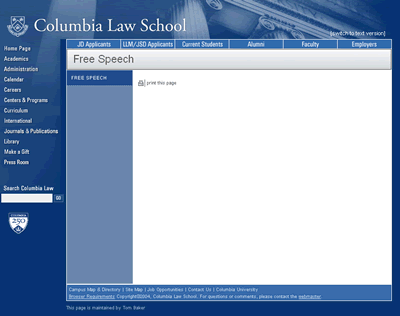So, What is Our Freedom of Speech at CU?
We're all aware that free speech is a hot topic at Columbia recently. The violence at the Minutemen speech was an interesting intersection of free speech in the right to protest and free speech in its pure form. As Bollinger pointed out in his first response, it's part of the American ideal of free speech that even ideas we disagree with should be allowed to be heard, and that we should counter them by exercising our own right to free speech, not through suppression. Various student groups replied that for some, the presence of the Minutemen is not a free speech issue; it's creation of a hostile environment. Less emotionally affected groups pointed out that Bollinger has excluded other speakers from campus because of security concerns, and that perhaps he should have exercised that discretion in this instance; and as a larger point, that the exercise of his discretion needs to be more transparent, with guidelines for student groups to work with.
All of this raises a threshold question for me (keep in mind I'm a 1L, so I haven't taken Con Law yet): What is the place of freedom of speech at private institutions? And at the particular kind of institution that Columbia represents?
According to the Foundation for Individual Rights in Education (FIRE), a watchdog group for freedom of speech on college campuses, private universities are not bound by the First Amendment. No surprise there. But FIRE then points out that most universities represent themselves as forums for debate and free thought and expression, and that they have a duty to adhere to that representation – which in many cases would mean using the same standard as a public university (which can, of course, limit the time, place, and manner of a speech so long as the limitation is without discrimination). Furthermore, FIRE points out, “private colleges and universities are contractually bound to respect the promises they make to students.” So what promises has Columbia made us regarding free speech? (Side note – Columbia gets a “red light,” the worst designation, on FIRE’s map of colleges across the nation.)

Oddly, the CLS free speech page is blank (does this have a meaning of its own?). Bollinger’s message in response to the Minutemen protest says that Columbia is dedicated to “respect[ing] the rights of others to express their views…students and faculty have rights to invite speakers to the campus. Others have rights to hear them. Those who wish to protest have rights to do so.” He then refers to “extensive University policies governing the actions of members of this community with respect to free speech and the conduct of campus events.” But I can’t find them. Maybe because I’m not a leader of an organization at Columbia, or because they’re not posted online. That might be first step toward repairing Columbia’s free speech reputation.
According to a Columbia Spectator article, however, Columbia’s position on free speech is in the appendix of the student handbook, Facts About Columbia Essential to Students. According to the article, the handbook states, "While the University as a private institution is not subject to the Constitutional provisions of free speech and due process of law, the University by its nature is dedicated to the free expression of ideas and to the evenhanded and fair dealing with whom it conducts its affairs." Apparently the handbook then goes on to say that protests and petitions are regulated by the University's rules in order to "protect the rights of all members of the University community." Some of these regulations include scheduling student protests with Columbia security, and the University’s right to restrict students from interfering with events on campus.
Student leaders quoted in Part II of the article, however, do say that cost of speakers and security are the biggest roadblocks to bringing speakers to Columbia, and that they’ve never seen a proposed speaker rejected for viewpoint or content. The article leaves the question hanging, however, of whether the University’s policies on security discourages student groups representing the minority from bringing controversial speakers, because the required security is so much more expensive.
Professors quoted throughout Part I of the article – including Dorf – emphasize that while the university is committed to free expression, any commitment to the First Amendment is entirely voluntary. All of this brings us full circle: Other than what the university chooses to publicly say, that we can hold it to, we don’t have freedom of speech on this campus. And Columbia’s not saying much. Back to state schools, anyone?
Labels: Bill of Rights, CLS

0 Comments:
Post a Comment
<< Home